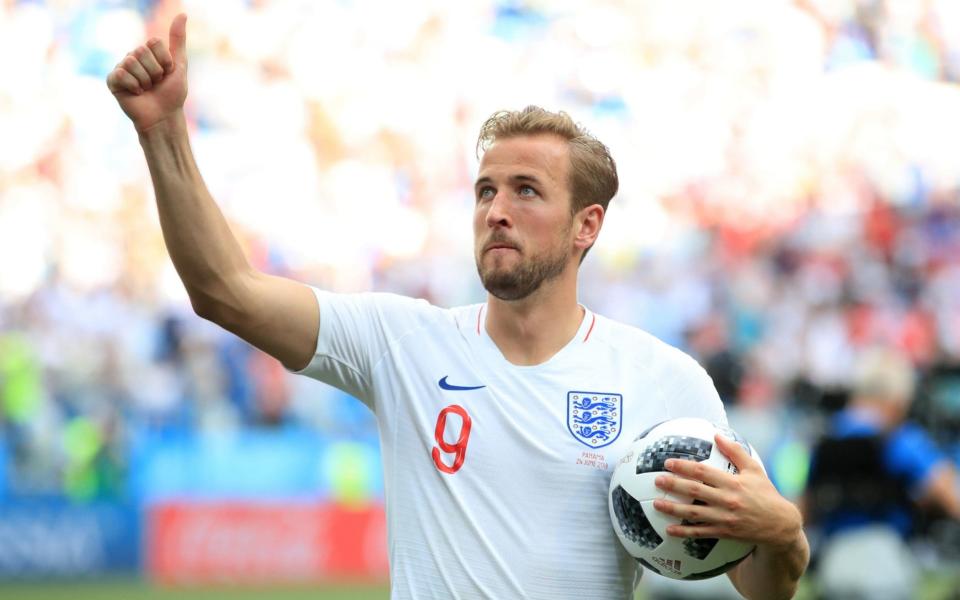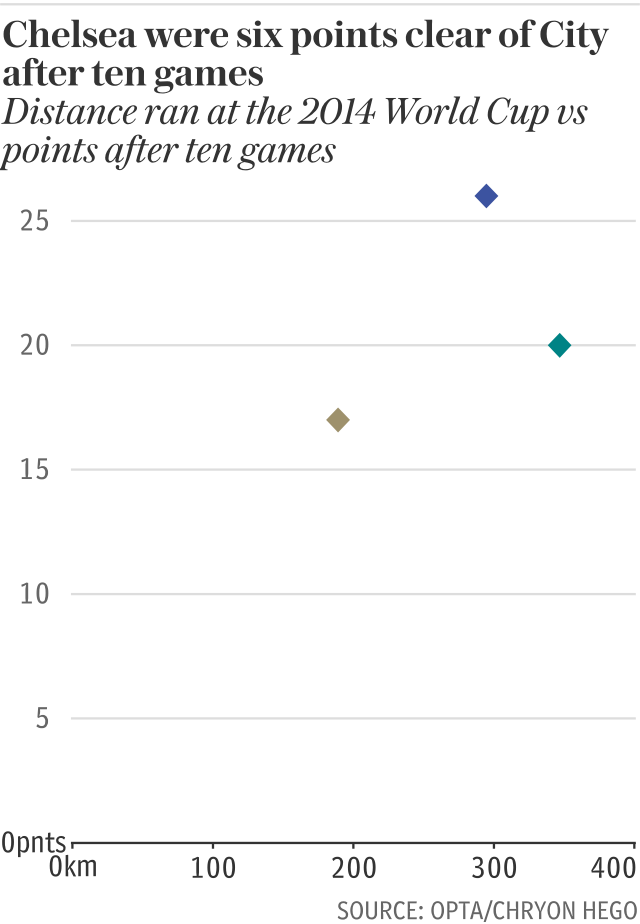World Cup fatigue? Premier League clubs have nothing to worry about and the facts prove it

With the start of the Premier League just a few days away, there have been concerns that World Cup fatigue could hamper some clubs this season.
But analysis from The Telegraph shows that following the 2014 World Cup in Brazil, players who participated in the tournament actually ran 0.33 kms more on average per 90 minutes in the first ten games of the 14/15 season compared to their subsequent performances in the first ten games of the 15/16 season (the next non-World Cup season).
Normally we would expect players to suffer negative effects in the early stages of a league season following a fatiguing World Cup, especially in the first ten games. As a result of this belief many managers choose to rest key players, even during important matches.
READ MORE: How the Premier League table would have looked without refereeing errors
READ MORE: Klopp’s sporting bucket list contains anything but football
READ MORE: Pogba ‘furious’ with Mourinho as exit rumours intensify
However, 47 per cent of the Premier League players who ran at least ten km in Brazil actually went on to run further in the first ten games of 14/15 compared with their first ten games in the 15/16 season.
The data shows that, for most players, there was very little variation in the distance that they were able to run in the first ten games of a post-World Cup season compared to their performance the following season.
These finding will come as a relief to Tottenham fans, with nine Spurs players taking part in the final stages in Russia last month. The club's players racked up a total of 4,816 minutes on the pitch, the most of any Premier League club.

Good clubs can cope with a strenuous World Cup
While it's hard to say with certainty what the effects of a strenuous World Cup are on clubs as a whole, the data suggests that well managed clubs are more than able to cope.
Manchester City, Chelsea, Manchester United, Arsenal, Tottenham, Everton and Liverpool players ran a combined 1,597.7 kms in Brazil, and played for 14,645 minutes.
Ten games into the following league season and the two teams that had racked up the most kms at the World Cup also occupied first and third in the table - Chelsea (294.7 kms) had 26 points, and City (337.3 kms) had 20.

Chelsea’s results during this period included key victories against Everton and Arsenal, while also picking up important points in away draws against the two Manchester clubs. This blistering start to the season formed the basis of what eventually turned into a title-winning season for the west London side.
Eden Hazard and Oscar both played influential roles in Chelsea’s fast start, despite running 42.1 and 70.6 kms respectively at the World Cup. Hazard scored important goals against Leicester, Arsenal and QPR, while Oscar netted against Aston Villa, Crystal Palace and QPR.
Both players would continue to impress, with Hazard going on to score 19 goals in all competitions for the eventual champions, and winning the PFA Player of the Year award in the process.
Manchester City made a similarly strong start to their season, despite having a tougher run on paper. Big victories against Liverpool, Spurs and rivals United were only slightly marred by disappointing defeats to Stoke at home and West Ham away.
Sergio Agüero, David Silva, Yaya Touré and Vincent Kompany all played significant roles for City during this period, despite running between 20 and 40 kms each in Brazil. Agüero netted in seven of City’s ten opening games, scoring a highly impressive ten goals in the process.
Across the season Agüero (32 kms at the WC) and Silva (21.2 kms) formed a potent attacking partnership. Silva scored 12 goals and made seven assists in the league, while Agüero made eight assists and scored 26 times en route to the golden boot award.
Six of the ten most "fatigued" players ran more per game in the first ten games of 14/15 compared to 15/16
Manchester City's Pablo Zabaleta was the Premier League player with the most strenuous tournament in 2014 - he ran an impressive 79 kms during his 720 minutes of playing time for Argentina.
However, rather than fatiguing him for the following season it actually seemed to invigorate him, as he was still able to run 10.1 kilometres on average per game in the first ten matches of 14/15 - very close to his 15/16 figure of 10.3 kms.
Mesut Özil played 655 minutes and ran 73.2 kms at the World Cup, and Arsène Wenger used this as an excuse on multiple occasions during the season to defend a number of poor performances by the player. However, again the data shows that his average running distance in the first ten games of the season was very similar to his stats for 15/16 - 10.4 vs 10.8 kms.
Of the ten players who should have been the most “fatigued” following the World Cup, only four of them - Özil, Zabaleta, Hazard and Per Mertesacker - ran less per game on average in the first ten games of 14/15 compared to 15/16, and even then the differences were only marginal.

Positive signs?
On the back of these findings then Tottenham fans shouldn't feel overly concerned about their players' contributions to this upcoming season.
Pochettino's men may also bring a lot of psychological benefits with them from the World Cup - Tottenham were the joint-highest scoring club in Russia along with Paris St-Germain, scoring a total of 12 goals (50 per cent more than any other Premier League Team).
Chelsea may also benefit from their player's progress in the tournament, with two of their players - N'golo Kante and Olivier Giroud - starting and winning the World Cup final.

